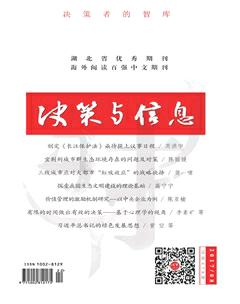打击全球腐败的五种方法
布莱尔·格兰克思
[摘 要] 腐败妨碍公平决策,分散公益资源,严重侵蚀人们对当政者的信任。国际社会在全球范围与腐败展开了严肃斗争,并取得了显著进展。为了杜绝贿赂,避免因为腐败导致的全球危机,打击腐败有五种方法:一是采纳责任制。二是企业引进。三是向金砖五国取经。四是聘用年轻人。五是支持反腐创新,其中关键点是应构建廉政文化,寻找机会彻底打败祸害社会的腐败问题。
[关键词] 反腐;责任制;反腐创新;廉政文化;公共政策
[中图分类号] D523.4 [文献标识码] A [文章编号] 1002-8129(2017)08-0053-05
The various crises currently dominating international headlines – Ukraine, ISIS, Ebola – dont appear to have much in common. But while the dynamics certainly differ, each of these challenges is underpinned by a common theme: rampant corruption. From the collapse of government in Ukraine and the revolution in Syria to the graft that has undermined health systems in West Africa, corruption has proven to be a driver of recent instability.
乌克兰问题、ISIS伊斯兰国极端恐怖组织、埃博拉等占据了国际新闻的头条,这些危机各有其不同的根源, 表面上共同之处不多,但在其背后都有一个共同主题:腐败猖獗。乌克兰政府垮台,叙利亚革命,贪污受贿对西非卫生系统的破坏,这些问题的背后都被证实,腐败是造成这些地区不稳定的驱动因素。
Corruption impedes fair decision-making, diverts resources meant for the public good and erodes our trust of those in power. Around the world, this lack of integrity has become entrenched, to the tune of $30 trillion over the past 15 years: half of global GDP.
腐败妨碍公平决策,分散公益资源,极大地侵蚀了人们对当政者的信任。在全球范围,在过去的15年因廉正缺失而带来的巨大损失计达30万亿美元,大约占全球GDP的一半。
Since the end of the Cold War, when the international community began to get serious about fighting corruption at a global level, significant progress has been made. Laws, regulations and commitments are now in place, from the OECD Anti-Bribery Convention to the UN Convention Against Corruption. Those responsible for some of the most egregious practices are now behind bars. Organizations such as Transparency International and Global Witness have empowered civil society to hold governments more accountable around the world.
自冷戰结束以来,国际社会在全球范围内与腐败展开了严肃地斗争,并取得了显著进展。国际社会制定了相关法律、规定,并做出承诺,为此,经合组织制定了《反行贿公约》,联合国制定了《联合国反腐败公约》,不少国家和地区均对严重的腐败行为责任人绳之以法。同时,一些国际透明组织、全球见证组织等国际组织也赋予民间组织更多权利,对政府进行问责。
The difficulty with corruption, however, is that it is an adaptive challenge which evolves quickly and seeps into gaps in systems and organizations as quickly as we are able to fill them. Rules and legal frameworks do not work when they are at odds with societies that are predicated on patronage; often, the arrest of some wrong-doers does not deter others, and civil-society efforts are often underfunded and uncoordinated.
但是,打击腐败的斗争困难不少,面临诸多不断变化的挑战。 组织体系中存在漏洞,腐败行为层出不穷,打击措施跟进不力,滥用职权,规定和法律体系不被认可,形同虚设,若干腐败分子的落网并不足以起到震慑作用,加上民众组织经费不足,难以协调。
To get to grips with bribery and avoid global crises that are driven by corruption, we need to mobilize new constituencies in creative ways, and provide them with the tools they need for success. Here are five ideas for how to do it:
为了杜绝贿赂,避免因为腐败导致的全球危机,我们需要通过新的方式来动员新的支持力量,并且为他们提供斗争胜利所需要的手段。这里就如何开展打击腐败提供5个建议:
1.Embrace accountability. Corruption is a symptom, not a cause, of systems that lack integrity. To beat it, we have to look at sustainable ways to build the accountability of those in power. This means giving everyone a say in how they are governed and making sure their voices are heard and responded to. There are lots of ways to do this, ranging from participatory budgeting to citizen report cards. These approaches put social pressure on decision-makers, which is a strong incentive to behave honestly.
1.采纳责任制。体制缺乏廉正,腐败是症状,而不是原因。要打击腐败,需要可持续的方法来树立当政者的责任。当政者让每一个人都建言管理方法,确保倾听他们的声音,对他们的意见要有反馈。实行公民参与预算,市民报告卡等方法。这些方法让决策者担起社会压力,强力促进他们诚信表现。
2.Bring in business. Forward-thinking, globally minded corporations understand that fighting corruption is good for ordinary people, good for the stability of societies and good for the bottom line. Companies are finding ways to not only adhere to the letter of laws, such as the Foreign Corrupt Practices Act, but also build a culture of integrity among staff and management. Moreover, projects such as the World Economic Forums Partnering Against Corruption Initiative and the B20 (which leads business engagement with the G20 group of governments) can provide valuable spaces for honest discussion.
2.企業引进。具有远见和全球视野的企业很清楚反腐有利于大众,有利于社会稳定,有利于明确底线。公司不仅会遵守法律条文,比如《美国海外反腐败法》,也会在员工和管理中构建廉正文化。不仅如此,世界经济论坛的合作反腐败计划、B20二十国集团工商界活动等项目为诚信讨论提供了有价值的平台。
3.Learn from the BRICS. It is easy to become disheartened when reports from Russia indicate that 80% of citizens believe corruption is much worse than it was 10 years ago. It is in the developing world, however, where some of the most effective anti-corruption initiatives are beginning to demonstrate real impact. In India, for example, the National Campaign for Peoples Right to Information (RTI) has transformed citizens ability to hold governments accountable. The RTI law has been used to gather information and has identified large-scale corruption in everything from the organization of the Commonwealth Games in Delhi to the 2G spectrum licensing process. The value of these kinds of initiatives is that they are locally owned, contextualized and sustainable. They also move away from the “one size fits all” approach that has hamstrung many Western anti-corruption efforts.
3.向金砖五国取经。来自俄罗斯的报告表明,80%的公民认为当今社会的腐败问题比10年前更加严重,这结果的确令人沮丧。但是,发展中国家所推行的一些有效的反腐败提议确实正显现出影响。比如印度的“公民信息权全国运动”已经将公民的权利转化为对政府问责的权利。印度应用公民信息权法案搜集信息,并查出在德里英联邦运动会组织以及2G频率许可证发放过程中出现的大规模腐败。这种类型的提案价值在于为当地所拥有,具有当地背景,具有可持续性。他们抛弃了许多西方的反腐措施,那些措施往往因其不切合实际而失去效力。
4.Engage millennials. It is well known that young people now constitute over 50% of the global population. But our experience tells us that this generation tends to be more energetic about these issues, less engaged in patronage networks and far more attuned to the use of technology than older generations. This makes them a critical constituency in efforts to fight corruption. The key is to meet these young people where they are – online, in the media and via cultural tools such as music– rather than with reports and seminars. If we can build communities of young people who understand accountability, it will be easier to fight corruption when they move into positions of power.
4. 聘用年輕人。众所周知,千禧一代占当今全球人口的50%以上。过去的经验告诉我们这一代人对于腐败问题更加关注,更少参与到滥用职权的关系网中,并且远比老一代人更会使用科技。这使他们成为反腐败的重要力量。关键是,与青年人沟通,不仅要采用报告和讨论会的方式, 更要采用青年人经常用的线上媒体,甚至采用音乐等文化工具。如果在青年人中能够建成懂得责任感的社会,他们掌权之后,就更容易反腐。
5.Support innovation. Just as corruption is constantly evolving, we must also work to continually adapt our responses, to ensure that citizens are engaged, to build accountability and keep graft in check. This means finding new ways to nudge forward reforms, such as the Open Government Partnership. We also need to develop creative collaborations to fund and support good ideas, like the Making All Voices Count initiative; and engage in debate around new ideas, such as that of an international anti-corruption force. It is only by rethinking the anti-corruption approaches of the past that we have a chance of beating this scourge in the future.
5.支持反腐创新。面对不断涌现的腐败,必须不断地调整应对措施,保证人人参与,树立责任,遏制贿赂。寻找新的方法推动改革,比如成立开放政府合作组织;发展创新型的合作,资助并支持好的想法,比如提出让所有声音有价值计划;参与到新思想的讨论,比如对国际反腐败力量的讨论。只有对过去的反腐败措施进行反思,我们才能够有机会在未来彻底打败祸害社会的腐败问题。
[责任编辑:谭晓影]
本文译自(https://www.weforum.org/agenda/2014/11/five-ways-beat-global-corruption/)

